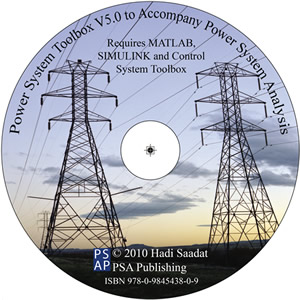POWER SYSTEM TOOLBOX
 The restructuring and deregulation of electric utilities, together with recent progress in technology, introduce unprecedented challenges and opportunities for power system research and open up new opportunities to young power engineers. The Power System Analysis Third Edition is designed to provide a good basic knowledge of the essential fields of power engineering. It provides an introduction to the fundamental concepts and modern topics in power system analysis with applications to “real world” problems. It produces competence for professional tasks in electric power utilities and related manufacturing companies. MATLAB and SIMULINK are integrated in the topics with an enriched Power System Toolbox that offers students the opportunity for hands-on experience in the design and analysis of power systems without the burden of detail programming. This ready-access toolbox enables the students to confidently apply the analysis to the solution of large practical systems with ease. The software modules are structured in such a way that the user may mix them for other power system analyses. The M-files for typical power system analyses are designed to work in synergy and communicate with each other through the use of some global variables. MATLAB Programs for typical Power System Analysis are as follows: The restructuring and deregulation of electric utilities, together with recent progress in technology, introduce unprecedented challenges and opportunities for power system research and open up new opportunities to young power engineers. The Power System Analysis Third Edition is designed to provide a good basic knowledge of the essential fields of power engineering. It provides an introduction to the fundamental concepts and modern topics in power system analysis with applications to “real world” problems. It produces competence for professional tasks in electric power utilities and related manufacturing companies. MATLAB and SIMULINK are integrated in the topics with an enriched Power System Toolbox that offers students the opportunity for hands-on experience in the design and analysis of power systems without the burden of detail programming. This ready-access toolbox enables the students to confidently apply the analysis to the solution of large practical systems with ease. The software modules are structured in such a way that the user may mix them for other power system analyses. The M-files for typical power system analyses are designed to work in synergy and communicate with each other through the use of some global variables. MATLAB Programs for typical Power System Analysis are as follows:
Generator and Transformer Models
The GUI program transformer and several other programs Addresses the steady-state presentation and modeling of transformers and synchronous machines.
Transmission Line Parameters
The purpose of transmission line is to transfer electric energy from generating units at various locations to the distribution system which ultimately supplies the load. For the purpose of modeling, the parameters of a multicircuit transmission line are obtained using the lcgui program.
Line Model and Performance
Several MATLAB functions and the lineperfgui program are developed for transmission line modeling, performance and compensation.
Load Flow Analysis
Power flow analysis involves the calculation of power flows and voltage of an interconnected power system during normal operation. Power flow studies are the backbone of power system analysis and design. They are necessary for planning, operation, economic scheduling and exchange of power between utilities. In addition, load flow analysis is required for many other analyses such as transient stability and contingency studies. Three programs lfgauss, lfnewton, and decouple are developed for the solution of power flow problems by Gauss-Seidel, Newton-Raphson, and the fast decoupled power flow, respectively.

|
